Cameron Chapman's Blog, page 9
September 26, 2011
There is No They
I currently have a lot of projects going on, and I sometimes get discouraged with the bigger ones (especially the feature film I'm planning to shoot next fall). Mostly this is due to outside pressure, real or imagined, about what I should realistically be spending my time on.
But here's the thing, I WANT to make a movie. For as long as I've wanted to be a writer, I've also wanted to make movies. I'm a storyteller, and that transcends medium. I have some stories that work well as novels (or novellas), and I have some that would work better as films. That's just the nature of my imagination.
And for a very long time, I let people tell me that it was all just a pipe dream. That I shouldn't waste my time on it, and I shouldn't get my hopes up, and I should "get a real job" (which I did, for awhile). I pushed aside my dream of writing for a living, of writing novels, and of making movies. I turned to more practical things. And I was very unhappy because of it.
Then, something happened: I started making money blogging. Then I started making a full-time living at it. I took the knowledge I'd gathered in my "real jobs" (mostly the parts I liked about my "real jobs") and wrote about it. And people paid me to do so.
I wrote some novels during this time, too, and thought I'd follow the traditional publishing route and spend years waiting for someone else to tell me that I was good enough. And then I started looking at some other authors who were going it alone, and self-publishing their books. And I gave it a try. I'm not super-successful at it yet, but I'm making progress. I'd say that as my backlist grows and I keep putting more time and effort into it, I should get to the point where my fiction makes up the bulk of my income.
And yet I still let people tell me that making a movie wasn't within my reach. That even if I could manage to make the thing, no one would ever watch it. It would slip into oblivion. I'd never be able to get talented people to participate unless I could somehow raise millions of dollars (and that I'd never be able to do such a thing without a track record). I believed them. I set aside my dream and figured that someday I'd just be happy if someone else wanted to turn my stories into movies. But even that was a long shot according to "them".
See, a lot of this comes from the fact that as a teenager, I had very big ideas. I was going to change the world. I was going to be famous. I was going to do something so incredibly awesome that everyone would take notice. And time and again I wasn't taken seriously. It's not that I necessarily had anyone telling me outright that I couldn't succeed. I just had a lot of people who scoffed at what I wanted to do and then stressed the need for a "backup plan". Everyone told me to go into business. Or to do something with a more "guaranteed" success rate. Basically, not to take chances. I rebelled by finding something creative that was still business-like: I got into design (which I enjoy, but not as much as I enjoy some other creative pursuits).
But you know what? I'm an adult now. No one has the right to tell me what I am or am not capable of doing. Of achieving. (Not that anyone had the right to tell me that as a teenager, I just didn't realize it then.) If I set my mind to something, I can achieve it. I've proved that to myself time and again, in all sorts of different avenues. I just have to make sure that "they" don't talk me out of it again.
And on that note, I wanted to share this video of Quentin Tarantino talking about how there is no "they". I feel like I should watch this video every single day. Every creative person should. Everyone who's ever wanted to do something and let someone else talk them out of it should watch this. Also, it's not exactly safe for work due to some of the content, but it is well worth watching.
September 16, 2011
Falling Literacy Levels are Alarming
I was reading an article over on Yahoo! News this morning (linked from The Millions) that was discussing the fact that SAT scores for reading have fallen to their lowest levels ever—489 points. Part of this they're attributing to the fact that more students are taking the test who may not have grown up in homes where English was the primary language, but part of it is likely due to the fact that we're now emphasizing math and science over reading and writing in schools.
This is really alarming to me. Literacy, according to some studies, is the best indicator of future success we have. And literacy does not just mean knowing basic reading and writing skills. There's this thing called "functional literacy" that varies based on the current conditions. Basically, it means that you have the necessary reading comprehension and writing skills to understand what you need to in a given situation. For some people, the level of functional literacy they require is quite low, and for others it's quite high. Writers fall toward the high end of the scale, because obviously we need to be able to use language in a way that people who don't write for anything other than necessity don't need. (Unfortunately, I've known way too many writers whose functional literary skills are lacking, to say the least, but I'm not going to get into that here.)
We've spent the past few years in the United States, and elsewhere in the world I'm sure, pushing math, science, and technology education over all else. And these things are important, for sure, especially the technology education. Without this, it's pretty hard to compete in our connected, global culture.
The big issue here is that we've decided that for many students, knowing how to do anything more than read and fill out a job application isn't necessary. For still others, anything more than a simple business memo, instruction manual, or other technical reading material, is overkill. We've decided that kids don't need to have excellent reading comprehension and communications skills because they'll be in jobs where technology is key. Where science is key. Where math is key.
I see one big problem with this: the quickest way to learn something new, is to read about it. Sure, you can watch videos to learn practical skills. But learning concepts, theories, and the reasoning behind those practical skills is best done through reading (or listening to podcasts or lectures, though I would argue that those same reading comprehension skills are necessary there).
I scored a 1200 on my SATs (back when there were only two parts: language and math, when it was still on a 1600-point scale). 660 in language and 540 in math. This was without studying and staying out too late the night before. I only took them once, because I didn't have time to take them again (and I was satisfied with my 1200). I attribute some of my language score to the fact that I'd had two years of Latin, and some to the fact that I was a voracious reader. (I attribute my low math score to the fact that I'd taken algebra 2 on my own, without the benefit of a teacher, in order to graduate another year early—I'd already skipped 6th grade.)
But here's the thing: I've since studied physics (including quantum mechanics), a little chemistry, and plenty of math. I've done it all on my own. I read books, articles, and research papers. I understand the things I'm reading, because even if I don't know exactly what something means, I have the ability to look it up and figure it out. I've taught myself everything I know about technology, too. Again, it's by reading and reading and then reading some more. My math, science, and technology skills can be directly attributed to my reading skills.
The best part about having a high level of literacy is that I also can see the holes in logic presented by some. I can question what they're telling me. I can look for other sources and figure out my own theories. I can argue my point with people who have substantially more formal education than I have, and can find sources, or simply use logic to back up my points.
We're robbing the current generation of kids in school of these abilities. By telling them that math and science are their keys to success, rather than literacy and critical thinking skills, we're all but guaranteeing that they won't be as successful as they could be. We're limiting their ability to learn anything on their own. We're limiting their ability to figure things out for themselves because they lack not only critical thinking skills, but the ability to comprehend what they read or what they listen to. If someone doesn't hold their hand through a process, they won't get it.
If we hope to compete in a global marketplace and keep up in a global culture, where India has more honor-level students than we have students, we need to teach kids to learn. We can't teach them what they need to know, because what they need to know changes on an almost daily basis. But we can teach them to teach themselves. We can give them the literacy skills they need to find things out on their own, to find the information they need, and to look critically at what they're reading and hearing.
The point here is that we need to stop focusing on teaching kids facts, and start teaching them how to learn for themselves. Science, math, and technology education is vital, but it can't come at the expense of literacy education. That includes both reading and writing skills. We need to place more emphasis on teaching our kids how to learn and less emphasis on making them memorize facts that they'll never use again. I don't have the answers on how to do that, other than to give kids more say in how their education is carried out, so that they actually want to learn. Give them a choice of what to read, of what to write, from a young age, so that they never get to the point where they say, "I hate reading."
September 1, 2011
Transparency in Indie Publishing, Month 7
So, here we are at the end of month seven! Not much in the way of promotion this month, other than discounting the second novella in The Steam and Steel Chronicles to $.99 through Labor Day. I'm honestly considering leaving it at that price, though I haven't made up my mind for sure yet.
Aboard the Unstoppable Aerostat Fenris
Amazon US: 80 (last month was 72)
Amazon UK: 6 (last month was 3)
Barnes & Noble: 10 (last month was 10)
Smashwords: 0 (last month was 0)
TOTAL: 96 (last month was 85)
The Great Healion Race
Amazon US: 49 (last month was 27)
Amazon UK: 4 (last month was 2)
Barnes & Noble: 5 (last month was 4)
Smashwords: 0 (last month was 0)
TOTAL: 58 (last month was 31)
Total sales for the month equalled 154, compared to last month's 118. So that was a nice jump from last month, where sales were almost stagnant. The total now sits at just under 600 books sold in seven months.
I also released Hold My Hand this month, and so far sales have been less-than-stellar. But I've only just started marketing it, and have a couple of book reviews pending. That went on sale for $.99 through Labor Day, too, but I think I'm going to bump it up to $4.99 after Monday.
August 23, 2011
Some Upcoming Changes
I've decided to do a bit of refocusing on this blog. It's been "Cameron Chapman On Writing" for a few years now, and I feel like it's too restrictive. So I'm going to change it to "Cameron Chapman On Creativity". This will give me more freedom to post about topics other than writing, including design and filmmaking. I'm also planning on running regular interviews with creative professionals across a number of industries.
I still plan on posting about writing quite a bit, but expect posts on other topics, too. I'm hoping to get onto a more regular posting schedule in September, after Labor Day. I might even shoot for posting twice a week!
Also, The Smashing Idea Book is now available on Amazon. It should be out elsewhere soon.
August 16, 2011
A Failure of Logic in Legacy Publishing
So I try to keep up with publishing news, if only because what's happening in the industry has a direct impact on how I sell my books. I need to keep abreast of what's going on if I want to be successful. That's true of any business.
One thing that we keep hearing over and over again when publishers try to defend their $12.99, $14.99 and $15.99+ ebook prices is that ebooks are nearly as expensive as hardcover books to produce and sell (because the physical book represents a very small percentage of the total cost), and therefore they need to price ebooks high if they want to remain equally as profitable.
I'm gonna call bullshit on this one.
First of all, I'm not talking about publishers who are selling their ebooks for $9.99. Those are the smart legacy publishers who know they can cash in on the marketing machine they have access to, and the names of their authors, to make more money. It's good business.
I'm talking about those publishers who sell their ebooks for more than $9.99.
Let's do the math real quick.
A publisher selling an ebook for $9.99 on Amazon, taking advantage of their 70% royalty option, is going to make $7.00 on each sale.
A publisher selling an ebook for $14.99 on Amazon, is only getting 35% of each sale, making only $5.25 on each sale.
A publisher would have to sell an ebook for $19.99 to make the same profit as a $9.99 ebook. And you're telling me they'll sell the same number of copies?
Like I said: bullshit.
Publishers prices ebooks high to protect the market share of print books. Because they know how to market print books. It's where they have a distinct advantage over indie publishers. They know how to get books into stores, and they know how to tap into readers of paperback and hardcover books.
Ebooks are like the wild west. Indie publishers and authors are on an almost level playing field when it comes to ebooks. And that's threatening to legacy publishers. Suddenly, instead of having competition coming from a handful of other big publishers who do things the same way they do, they've got competition from tends of thousands of little guys who can do pretty much whatever they want in terms of marketing and promotion. Those little guys have no overhead, they have no offices to pay for or employees to pay, and they're much more agile because of it.
So, the next time you hear some legacy publisher claiming that they're ebooks are priced at $12+ because their costs are high, call them on it. Call it out for the bullshit story that it is.
August 15, 2011
Two Books on Sale Through Labor Day
From now through Labor Day (September 5th), I'm offering all of my books for $.99. The prices should be updating on Amazon and Barnes & Noble within the next day or so. For Smashwords, you'll need to use a coupon code (which is active right now). The code for Hold My Hand is ZW52W and the code for The Great Healion Race is XN97R.
Why am I doing this? Because August is traditionally a very, very slow month for ebook sales. I don't want to lose momentum this month, so I'm hoping that by running a special like this, I can attract more new readers. After the 5th, they'll both return to the $2.99 prices in all likelihood (though if my sales go way up, I may keep them at $.99 for awhile).
Here are the purchase links:
The Great Healion Race
Barnes & Noble | Kindle/Amazon US | Kindle/Amazon UK | Smashwords
Hold My Hand
Barnes & Noble | Kindle/Amazon US | Kindle/Amazon UK | Smashwords
Aboard the Unstoppable Aerostat Fenris
Barnes & Noble | Kindle/Amazon US | Kindle/Amazon UK | Smashwords
(This has always been $.99)
Now, if you buy the books at this price and love them (or even if you hate them) I'd love a review on Amazon, Goodreads, or elsewhere!
August 9, 2011
No More Times New Roman! Font Combinations for Book Design
I have seen way too many people involved in the indie publishing scene who say, "Don't get caught up in the whole font thing. Just use Times New Roman. It'll be fine." As a designer, I have to say that this borders on infuriating to me. Typography is important. It has a direct impact on how we perceive a written document, and our enjoyment of that document. Times New Roman was originally developed as a newspaper font, specifically to be economical, space-wise. In other words, to fit more content in less space. It then became popular among corporate documents. But optimal readability is not among Times New Roman's strong points.
If you plan to indie publish in print, then it's vital that you understand the basics of book design and layout (or that you hire someone who does). The typefaces you choose for your text and headings have a direct effect on the readability of your text (along with your margins, line spacing, and kerning). Bad typography makes your book look less professional, even if you readers don't directly realize what it is that's giving them a negative impression of your book.
Below are fourteen combinations, mostly made up of free fonts. Some are more suited to one type of book or another, and have been noted as such. Others are more universal, and can be used on virtually any kind of manuscript.
ChunkFive and Droid Serif
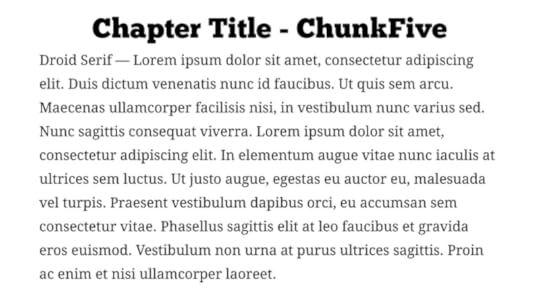
Chunk Five is available from The League of Moveable Type. Droid Serif can be downloaded from Font Squirrel. Both are modern typefaces, and well-suited to a variety of genres.
Dancing Script and Neuton
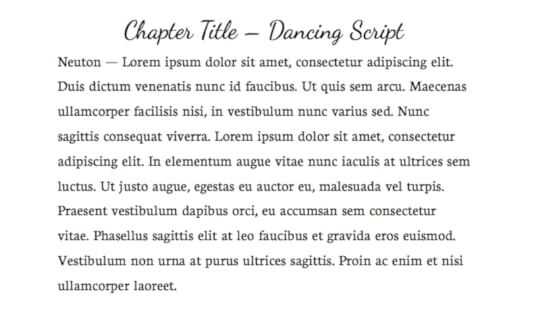
Neuton and Dancing Script are both available from Font Squirrel. Dancing Script is a very readable script font, making it ideal for chapter headings.
Didot and Optima

Didot and Optima are both very modern typefaces. Optima is one of the few sans serif typefaces well-suited for text in a printed book. There's a free version of Didot called Theano Didot available from Font Squirrel.
Gill Sans and Crimson
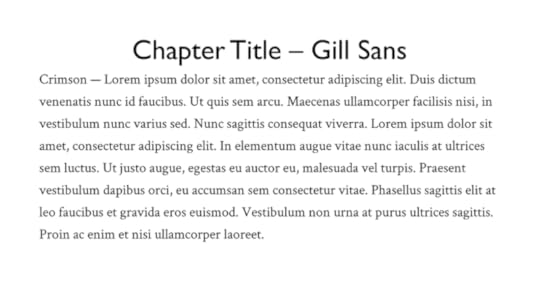
Gill Sans (which is included on many computers) and Crimson are both fairly traditional, classic typefaces, well-suited to a variety of genres.
Idolwild and Linux Libertine
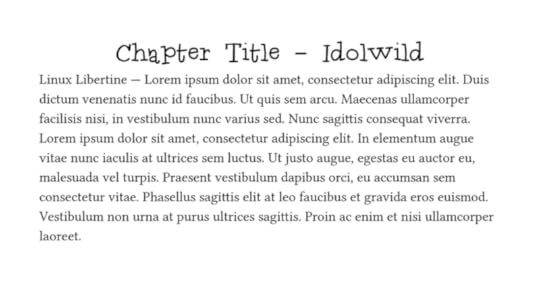
Idolwild is a much funkier typeface than many of the others here, and combined with Linux Libertine, would work well for a middle grade novel, or even a light fantasy novel.
Junction and Fanwood Text

Junction and Fanwood Text are both available from The League of Moveable Type. They're versatile when used together, suitable for most genres.
Kingthings Exeter and Prociono

Kingthings Exeter and Prociono would be excellent for a historical novel.
The Last Font I'm Wasting on You and Garamond
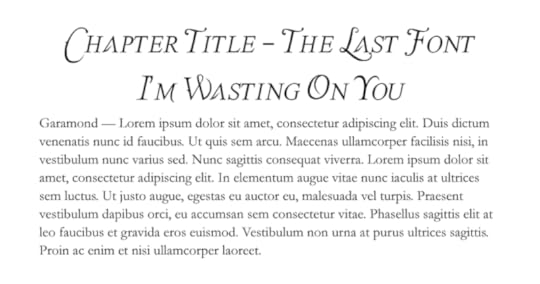
The Last Font I'm Wasting on You and Garamond would be great for a romance or historical novel, as well as some fantasy.
Optima and Cardo
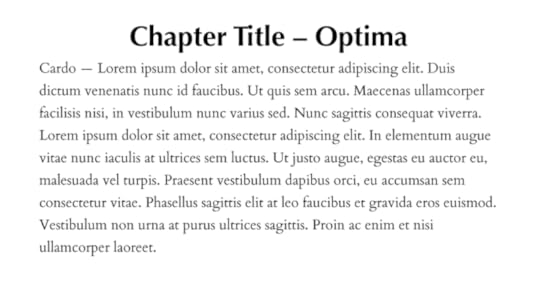
Optima is suitable for titles, too. Combined with Cardo, it makes for a very versatile pair.
Rockwell and Goudy Bookletter 1911
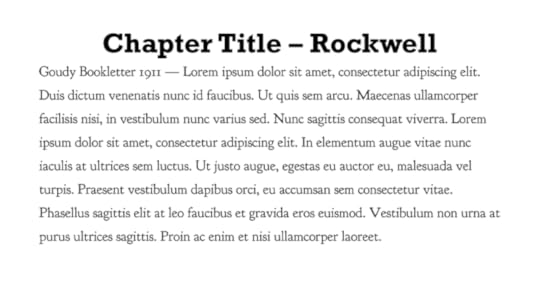
Rockwell and Goudy Bookletter 1911 are both vintage-looking fonts, though they're timeless enough to be used for much more than just historical fiction.
Savoye and Linden Hill

Savoye and Linden Hill would be great for a romance novel, though they're versatile enough to be used for other genres, too.
Tagettes and Calluna
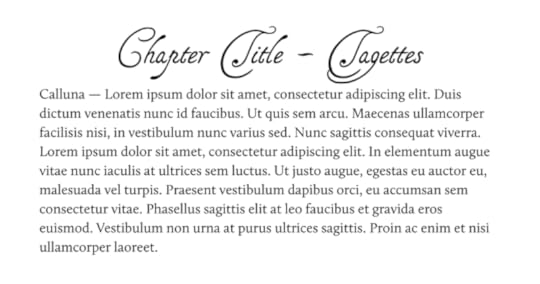
Tagettes and Calluna would be great for historical fiction, or fantasy.
Ubuntu and Gentium
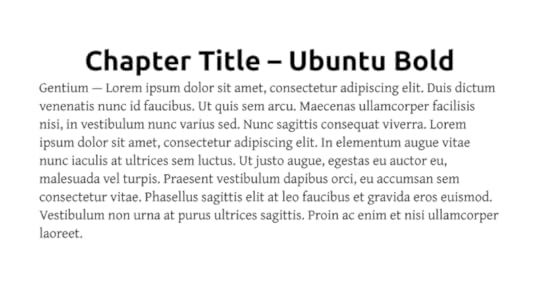
Ubuntu and Gentium are both modern, and very versatile.
The main thing you need to remember when it comes to designing book interiors is that readability is key. You want to stick to mostly serif fonts for your main text. Occasionally a sans serif typeface is suitable, but generally they're less readable in big blocks of printed text. While you can go with a much fancier font for your chapter titles, it's still important that they be readable. It's also a good idea to stick to just two typefaces for your interior design, as more than that can just make your book look cluttered.
August 5, 2011
Hold My Hand is Now Available!
Just an update to let everyone know that Hold My Hand is now available in ebook form on Amazon (including the UK), Barnes & Noble, and Smashwords. The price for right now is $2.99, but I plan on raising that at some point in the future (like early winter) to $4.99. I'll also be putting out a paperback version sometime this fall. It's women's fiction, and completely different from The Steam and Steel Chronicles.
Here's the blurb for Hold My Hand:
After finding out her husband is having an affair, Leilah flees to the comfort of her grandmother's house, where she discovers she's pregnant.
Hopes of reconciliation evaporate when Leilah's husband accuses her of using the pregnancy to trap him in their failed marriage.
Leilah—jobless, husbandless, and still living with her Gran—reluctantly chooses to have an abortion. When complications arise, it's Hank, Gran's good-looking neighbor, who rushes her to the hospital.
It's the start of a friendship Leilah hadn't expected, and isn't sure she's ready for—especially when her feelings for Hank start pushing the limits of "friendship."
Out of the blue, her husband reappears. Even though he's a bastard (in Gran's opinion, anyway), Leilah isn't sure she's ready to just throw everything away.
She struggles to reconcile the life she wanted, with the life that's been forced on her.
Or maybe it's the other way around…
You can also find it on Goodreads. If you read it, I'd really appreciate an honest review, either on Goodreads or wherever you purchased it!
August 2, 2011
Transparency in Indie Publishing, Month 6
Wow, so I've been selling my novellas online for six calendar months now! Holy cow!
Sales went up in July, but only just barely. This tells me that I need to get my butt in gear and finish up book 3 and get it out there. Also, I'm starting on it today, as part of Camp NaNoWriMo!
So, without further ado, here are the numbers for this month:
Aboard the Unstoppable Aerostat Fenris
Amazon US: 72 (last month was 58)
Amazon UK: 3 (last month was 6)
Barnes & Noble: 10 (last month was 18)
Smashwords: 0 (last month was 2)
TOTAL: 85 (last month was 84)
The Great Healion Race
Amazon US: 27 (last month was 28)
Amazon UK: 2 (last month was 0)
Barnes & Noble: 4 (last month was 3)
Smashwords: 0 (last month was 0)
TOTAL: 31 (last month was 31)
Total sales for the month equalled 118, compared to last month's 115. So, not the best numbers, but at least it's still an improvement. The total now sits at 441 books sold in six months.
The good news: I did spend most of the first half of the month in the top 100 in the Historical Fantasy charts on Kindle, and even broke into the Historical Fantasy books top 100 list (which includes both print and ebooks).
I did get a pretty bad 2-star review on Aboard the Unstoppable Aerostat Fenris toward the end of the month. So that sucks. I think it had a negative effect on sales, but I'm not sure. I'd like to ask anyone who's read the book to please take a moment to leave a review on Amazon or elsewhere, even if it's not a glowing review. More reviews make a book look more successful, even if they're not all positive. I currently have no reviews at all on The Great Healion Race.
Again, I've been doing next to no publicity for the books, and I know that has to change. Especially since I'm getting ready to add a completely new book to the mix (not part of The Steam and Steel Chronicles, and not even in the same genre).
August 1, 2011
Repeat After Me: There's No Such Thing as Writer's Block
New and old writers alike are often stopped in their tracks at the mention of The Demon Writer's Block™. Every time they have a hard time writing, they fear it's the beginning of The Demon Writer's Block™ and that their writing career is effectively over.
I once claimed that I had The Demon Writer's Block™ for six years. SIX YEARS! And it's true that for roughly six years I didn't really write anything. But that wasn't The Demon Writer's Block™. It was due to other factors, including that I just wasn't putting in the effort. It's that whole BIC (Butt In Chair) strategy that I just didn't get at that time.
Now, just because there's no such thing as The Demon Writer's Block™ doesn't mean that there aren't reasons why you're having a hard time writing (or why you can't write at all). But we've built The Demon Writer's Block™ up into this mythical being, a metaphorical demon binding our hands, preventing us from getting anything done at all. And that's not the case. In fact, there are two relatively mundane things that contribute to so-called "writer's block". Both are, more or less, manageable once you're aware that they exist.
So, what are these two all-powerful things that can control our writing productivity (if we let them)?
Simple: STRESS and FEAR.
Stress
Stress is my own personal Demon Writer's Block™. If I'm stressed out, I have very little chance of writing anything productive, or anything at all. That's what that six year stretch of "writer's block" was for me. I was working crazy hours for part of that time, my then-boyfriend (now-husband) and I were completely broke for most of that time (between one or the other of us either being unemployed or part-time employed, through trying to start a business, and then through the process of buying a house when we had absolutely no disposable income), I got married during that time (wedding planning stress is hell if you've never been through it; also, I wouldn't recommend it, elope while you still can!!!), and I had a love-hate relationship with at least one of my jobs during that time.
Basically, I was stressed to the point of tears on a regular basis. Of course I couldn't write anything. I was too worried about how I'd pay my bills, what house we were going to buy, where we wanted to live, what wedding dress I wanted, and the list goes on.
But here's the thing: stress is mostly manageable, except in the most extreme circumstances. If you recognize that you need to de-stress in order to write, then you can take steps to do so. Maybe you need to meditate or do yoga before you write. Or maybe you need to get out of your house and go somewhere quiet and private. Maybe you need to kick your significant other and/or your kids out of the house for one evening or afternoon each week to have some alone-time to write. Or maybe you need to exercise before you write and get those endorphins flowing. Whatever works for you is fine.
The point here is that stress is not The Demon Writer's Block™. It's stress (which could be considered a demon in its own right). A part of just about everyone's lives, and something we have to learn to deal with as productive adults. And before anyone jumps on me for saying "it's just stress", realize that I used to have issues with severe anxiety (the kind that causes panic attacks and makes you feel like you've gone absolutely bat-shit crazy), so I've dealt with extreme stress. Again, it's something you can learn to manage.
Fear
Fear is the more troubling of the two causes for "writer's block", because it's often a lot harder to overcome. It's harder to even pinpoint as a source. Fear can creep in when you least expect it and absolutely paralyze you. And it comes in a few different varieties, which each affect different people.
There's the "I'm never going to be good enough" fear (also known as the "I-SUCK-I-SUCK-I-SUCK" fear). This is the fear that what you're about to write isn't going to be very good. In fact, it's going to be so bad that not even your own mother would love it. Here's the thing about this kind of fear: you're probably right. But that's okay. Give yourself permission to write crap. This is especially true with a first draft, and especially true if you're new to this whole writing thing. You're going to have to write a lot of crap to get to the good stuff. I've been writing fiction solidly for about three years now (not counting all the dabbling I'd done before this), and I still write a lot of crap. Stephen King's been at this for decades and I bet he'd tell you that a lot of what he writes is still crap, at least on the first draft level (though some people would probably argue at any level—I'm not one of them). Once you've given yourself permission to write crap and get out of your own way, you might be surprised by some of the gems you end up writing.
Even if you overcome this in the writing stage, it's likely to rear its ugly head again once you start getting some success. Then you start to worry that you're really just a hack and that people were being nice because you were new. The fear of not just sucking, but of publicly sucking, can be even more paralyzing. You know what? You're probably going to get bad reviews. At least once. You can't please everyone. If you're happy with what you've written, then (excuse my language) fuck 'em.
There's the "No one's going to take me seriously" fear (AKA the "They're all going to laugh at me" fear). It sucks when the people in your life don't support what you're doing. But a lot of the time, the reason they don't support you for going after your dreams is because they're too afraid to go after their own. They're jealous of you for doing something that they might only have dreamed about. This is why so many writers opt not to tell anyone they know about their writing until they've gained some level of success. Don't ever let anyone else's opinion stop you from doing what you want to do. Realize that it's their own insecurities that cause them to criticize you.
The two fears above can often team up to really stop you in your tracks. You worry that you're not good enough and so no one is going to take you seriously. They'll laugh at you because you suck. You'll never get published, your writing will rot in a desk drawer until eternity, and someday they'll unearth it and use it as a cultural study for how stupid and illiterate ancient humans were. Well, think of it this way: if that happens your writing will have achieved what most authors dream of. Immortality and enduring fame! There's not much you can do about how other's perceive your work. What you can do, though, is keep writing, keep getting better, and decide for yourself, based on your own criteria, whether your writing is good or not. And to make yourself feel better about your own writing skills, just go read Twilight or a Dan Brown novel. (Sorry, I know cheap shots at other writers are distasteful, and I realize that both of those obviously appeal to a large group of readers, but I'm trying to make people feel better here! And I hereby give you permission to go read my writing and say it sucks if it makes you feel better about your own writing, though I would ask that you don't do so publicly on Amazon.)
The fear of "I'm too old for this" or "I have too many responsibilities" or "I'm neglecting my kids if I take time to write". All of these are ridiculous. No one says you have to quit your day job and become a full-time aspiring novelist (in fact, I'll be the first to tell you not to do that). No one says you have to shirk your responsibilities to write. And no one says you have to ignore your kids to find time to write. Even if all you do is write for fifteen minutes each day, that's something. In fifteen minutes, you can probably write between 250 and 500 words minimum (I can do 800-1,000 in that time if I'm really in the groove of my story). If you can manage 500 words every day, then it will take you less than 6 months to write a first draft. At 250 words per day it'll take you less than a year. So find that 15 minutes every day and write. Try to find an afternoon once in awhile to really focus on your writing and get four or five times your usual word count.
A special note to the "I'm too old for this" crowd: YOU'RE NOT GETTING ANY YOUNGER. You'll never again be as young as you are now. Writing is the great equalizer. No one who reads your writing ever needs to know how old you are unless you choose to reveal it. You could be 17 or 70. And honestly, no one cares how old you are if what you've written is good. Think about how much more life experience you're bringing to the table compared to someone who's only in their 20s or 30s. Are you really going to look back in ten or fifteen years and say to yourself, "I never should have tried that writing thing. I was just too damn old," ? I doubt it.
There are other fears out there, and most of it comes down to our insecurities about who we are and our place in the world. But find a way to overcome them and stop letting them control what dreams you go after.
So there you have it. The two main things that we mistake for The Demon Writer's Block™. I'm sure some of you would argue that regardless of the cause, it's still "writer's block". I disagree. We need to stop giving these important-sounding names to things as mundane and common as fear and stress. By making it out to be more than it really is, we're giving power to writer's block and stopping ourselves from doing what we want to do. So stop giving in to fear and stress, stop calling them The Demon Writer's Block™ when in reality they're emotions that every person on earth has to deal with on a regular basis, and find a way to get through them!



